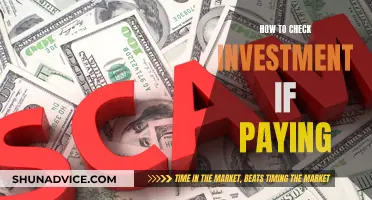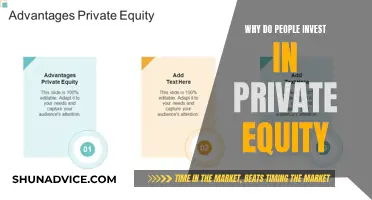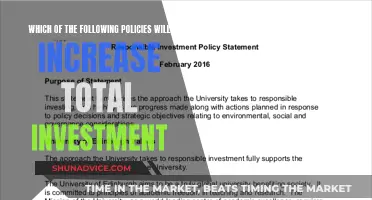
There are concerns that the shift to passive investing is creating a bubble that will eventually pop. Passive investment has been blamed for inflating the stock market bubble, with trillions of dollars flooding into passive funds in recent years, reshaping the US stock market and insulating it from a sustained bear market. This shift has been characterised as moving from price-sensitive active investors to value-agnostic passive investors, which has contributed to rising stock valuations. However, some argue that this concern is misguided, and that the high PE ratio is driven more by bullish market sentiment than inflows to passive funds.
What You'll Learn

Passive investing drives up market valuation
Passive investing has been blamed for inflating the stock market bubble. Trillions of dollars have flooded into passive funds in recent years, which has resulted in inflated valuations and insulated the US stock market from the threat of a sustained bear market. Vincent Deluard, a global macro strategist, argued that these unprecedented flows have led to structurally higher stock valuations that are disconnected from company fundamentals. This shift from "price-sensitive" active investors to "value-agnostic" passive investors has played a part in pushing up stock valuations.
The popularity of passive investing has resulted in a reduction in the overall trading volume. This means that there are fewer market participants correcting for mispricing, which can lead to longer bubbles and increase the riskiness of contrarian strategies. Additionally, passive funds ignore valuations or company fundamentals and invest solely on the basis of float-adjusted market capitalization, which can drive up the valuation of large-cap companies and the whole market.
However, some argue that the high PE ratio is driven by the bullish market sentiment rather than inflows to passive funds. The collapse in interest rates and colossal central bank asset purchases witnessed since the global financial crisis have also likely played a bigger role in increasing stock multiples. Furthermore, the majority of equity assets are still managed by active managers, and if they believe the market is expensive, they can sell their positions or close their funds.
Billionaire investor Carl Icahn has warned that passive investing could lead to a crisis bigger than 2009, as investors are making the mistake of treating the market like a casino, with too much money flowing into index funds without knowing what they own. With interest rates held exceptionally low for a prolonged period, stocks became relatively more attractive, resulting in massive inflows into passive index funds.
Young Investors: Roth or Not?
You may want to see also

Passive investing ignores fundamentals of individual stocks
Passive investing has been blamed for inflating the stock market bubble. Trillions of dollars have flooded into passive funds in recent years, which has resulted in higher stock valuations. This has been disconnected from company fundamentals, benefiting large and growth stocks at the expense of smaller value stocks. Vincent Deluard, a global macro strategist, has argued that this shift from "price-sensitive" active investors to "value-agnostic" passive investors has contributed to rising stock valuations.
Passive funds, by definition, ignore valuations or company fundamentals and invest solely based on float-adjusted market capitalization. Critics argue that this type of investment drives up the valuation of large-cap companies and, consequently, the entire market. However, proponents of passive investing argue that the popularity of passive investing and high market valuations are coincidental rather than causally related. They attribute high PE ratios primarily to low-interest rates, improving economic growth, and solid corporate earnings.
Billionaire investor Carl Icahn has warned that passive investing could lead to a crisis bigger than 2009, stating that investors are making a mistake by treating the market like a casino and not knowing what they own. With passive investing, investors may have heavy exposure to certain stocks, and in the event of market turmoil, they could experience significant losses.
The rise of passive investing has also been associated with a potential breakdown in price discovery. Passive investing neglects company-by-company stock analysis, which could lead to mispricing in financial markets. However, empirical evidence suggests that the market is still dominated by active investors, and the fear of "dysfunction" caused by passive investing may be exaggerated. Active investors continue to have ample opportunities to generate excess returns.
While passive investing has grown significantly in recent years, it is important to note that the majority of equity assets are still managed by active managers. As such, both active and passive funds are responsible for the current high PE ratios.
Investing for Retirement: A Conservative Approach to Financial Security
You may want to see also

Passive investing is undisciplined
Passive investing has been described as "undisciplined" by some commentators, who argue that it can lead to market inefficiencies and mispricing. This view holds that passive investing neglects the fundamentals of individual stocks, contributing to a disconnect between stock prices and their intrinsic values.
The argument against passive investing is based on the idea that it ignores company-specific analysis, instead investing solely based on float-adjusted market capitalization. This means that passive investing can drive up the valuations of large-cap companies and the overall market, potentially creating a bubble.
However, critics of this view argue that the popularity of passive investing and high market valuations may be coincidental, influenced by factors such as low-interest rates, improving economic growth, and solid corporate earnings. They also point out that the majority of equity assets are still managed by active managers, who can sell their positions or close their funds if they believe the market is overvalued.
Proponents of passive investing also argue that it provides investors with better tools to actively manage asset allocation and sector rotation, potentially making the market more efficient at the asset class and sector levels.
The debate around passive investing centres on the potential impact on market efficiency and price discovery. While some argue that passive investing can lead to market dysfunction, others believe that the size of passive investments is not large enough to cause significant issues.
In conclusion, while there are concerns about the potential for undisciplined passive investing to create market inefficiencies, it is important to consider other factors influencing market valuations and the role of active fund managers in maintaining market discipline.
Understanding the Present Value Advantage
You may want to see also

Passive investing is a self-reinforcing cycle
Passive investing has been described as a "self-reinforcing feedback loop" by Barron's, where the success of indexing bolsters the performance of the index itself, which in turn promotes more indexing. This cycle has been further reinforced by the shift from \"price-sensitive\" active investors to "value-agnostic" passive investors, which has contributed to pushing up stock valuations.
The popularity of passive investing can be attributed to various factors, including the underperformance and high fees associated with active management, as well as the prolonged period of low-interest rates that made stocks appear relatively more attractive. As a result, there has been a significant influx of money into passive funds, with trillions of dollars flooding into these funds in recent years. This shift has led to concerns about the potential impact on the health of financial markets, with critics arguing that passive investing drives up market valuations, creates a bubble, and hurts price discovery.
The growth of passive investing has been particularly notable in the US, where as of the end of July 2024, $7.3 trillion was held in passive open-ended and exchange-traded funds investing primarily in US equities, outweighing the $6.6 trillion in comparable actively managed funds. However, it's important to note that passive investing still only accounts for a minority of trading activity, and the majority of equity assets are still managed by active managers.
While some argue that passive investing contributes to market dysfunction and high valuations, others disagree. Vincent Deluard, a global macro strategist at brokerage StoneX, attributes the high market valuations mainly to bullish market sentiment rather than inflows to passive funds. He also acknowledges that the passive revolution has brought benefits, such as lower fees and increased tax efficiency for investors.
Despite the debate, the trend towards passive investing shows no signs of slowing down, and it remains to be seen whether it will indeed turn out to be "just another Wall Street fad" as Seth Klarman predicted in his 1991 book, Margin of Safety.
Shares vs. Mortgage: Where Should Your Money Go?
You may want to see also

Passive investing is not a new concept
Since then, passive investing has become an increasingly popular strategy. As of 2018, Vanguard stated that index funds own "15% of the value of all global equities". This shift towards passive investing has been driven by several factors, including the lower fees, increased tax efficiency, and superior after-tax results compared to actively managed portfolios.
However, it's important to note that passive investing also has its drawbacks. One of the main concerns is the potential for asset bubbles due to the increasing popularity of passive investing. Additionally, passive investing is subject to total market risk, and the lack of flexibility can be a limitation during market downturns.
Measuring Investment: People Over Profits
You may want to see also
Frequently asked questions
Passive investment involves investors putting their money into passive funds or index funds, which are based on float-adjusted market capitalization, rather than company fundamentals or valuations. The popularity of passive investment has grown in recent years, with trillions of dollars flowing into passive funds. Some analysts believe that this has contributed to a stock market bubble, with the current high price-to-earnings (PE) ratio driven by bullish market sentiment.
The passive investment bubble may pop due to a market correction or crash. Billionaire investor Carl Icahn has warned that passive investing may "implode and could lead to a crisis bigger than 2009", with investors suffering significant losses if they have heavy exposure to certain stocks. However, others argue that the impact of passive investing on market dysfunction and price discovery is overstated, and that active investors still dominate the market.
If the passive investment bubble pops, it could lead to a market downturn or financial crisis. Investors who are heavily invested in passive funds may experience losses, and there could be a rush for the exits as sentiment shifts away from passive investing. However, it's important to note that any market correction or crash would also depend on various economic and market factors, and the impact of passive investing specifically is difficult to predict or measure.







